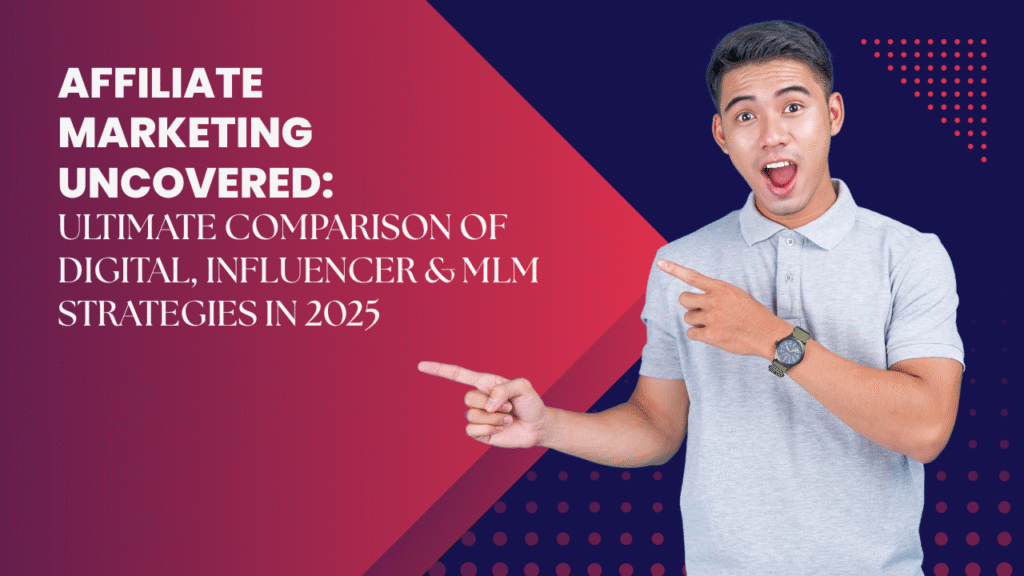
Introduction
One of the leading methods for generating online income in the current digital landscape is affiliate marketing. The digital age demands a clear understanding of how affiliate marketing stacks up against major online strategies like digital marketing and MLM among others. The in-depth guide delivers a complete analysis of multiple strategies which enables readers to identify their best approach for 2025.
According to Statista projections, affiliate marketing spending in the United States will surpass $8.2 billion by 2025. Affiliate marketing’s expanding presence in mainstream markets signifies its acceptance and creates new opportunities for marketers and content creators. Digital marketing methods continue to evolve rapidly, which requires both new marketers and experienced professionals to carefully evaluate their strategies.
1. Understanding the Core Concepts
1.1 What Is Affiliate Marketing?
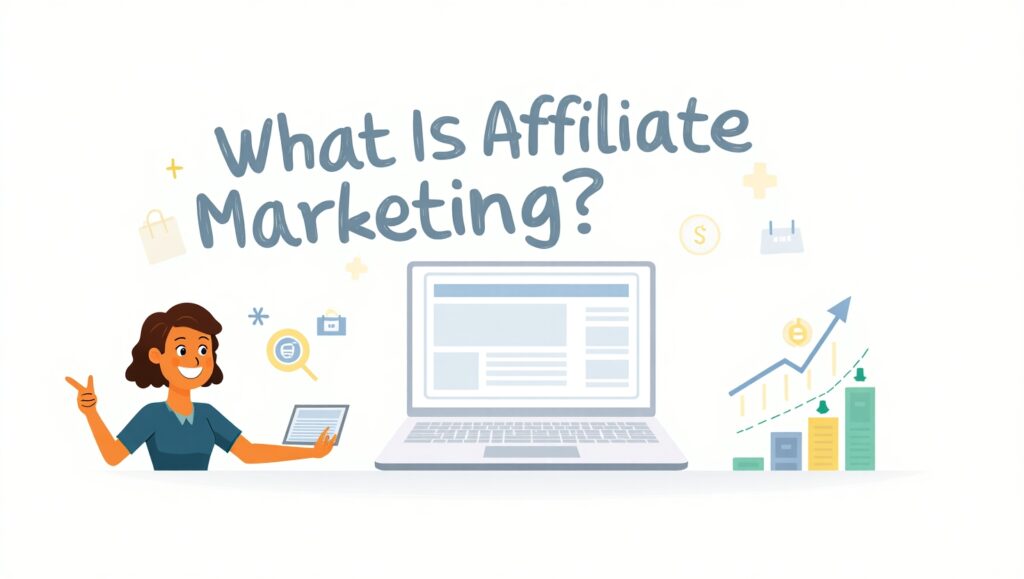
Affiliate marketing represents a performance-based marketing approach where individuals known as affiliates use unique tracking links to promote a merchant’s products or services. Affiliates receive commissions whenever a consumer clicks their link to perform a specific action such as making a purchase or registering for a service. Affiliate marketing benefits both brands through cost efficiency and marketers through high profitability.
The core model typically includes four key roles: The fundamental structure of affiliate marketing involves four main components which are the merchant, the affiliate, the consumer, and the network. The affiliate platforms Amazon Associates, ClickBank, ShareASale, and Rakuten simplify affiliate marketing through facilities ranging from link generation to comprehensive reporting dashboards.
Achieving success in affiliate marketing requires high-quality content combined with proper audience targeting. To establish trust and naturally promote recommendations affiliates utilize SEO practices along with blogs email funnels and social media platforms.
Case Study: A food blogger establishes a partnership with a kitchen appliance company that enables her to include affiliate links within her recipe articles. The food blogger generates $12,000 from passive income by sharing in-depth air fryer tutorials and reviews over six months. Her blog engagement grew by 40% throughout this period.
1.2 What Is Digital Marketing?
Digital marketing represents all marketing strategies that promote products or services through online platforms. Digital marketing has wider goals than affiliate marketing because it includes increasing brand visibility while generating leads and enhancing customer engagement.
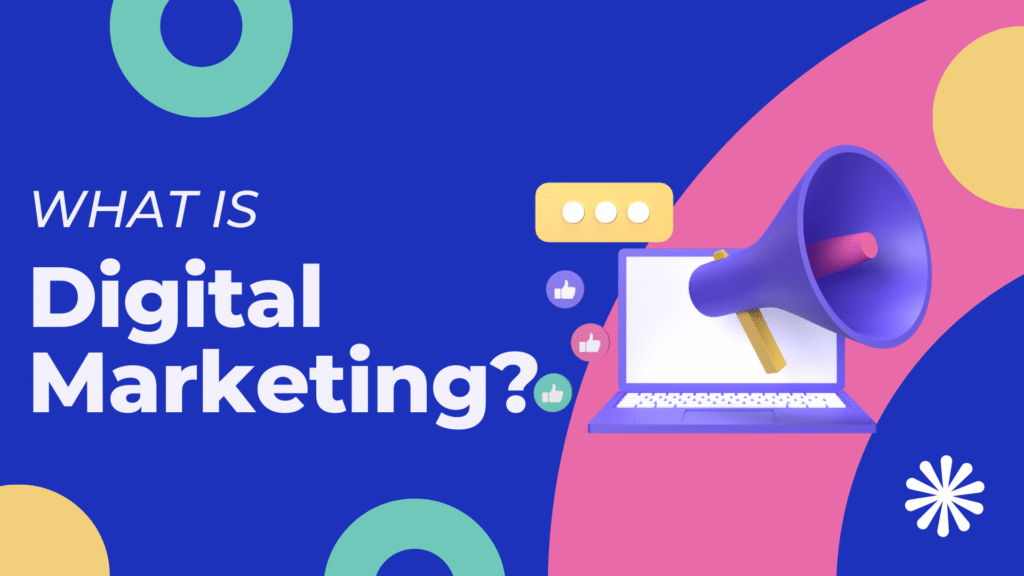
It includes:
- SEO (Search Engine Optimization)
- PPC (Pay-Per-Click Advertising)
- Email marketing
- Social media marketing
- Content marketing
Google Analytics, alongside CRM systems and automation platforms, serve as essential tools for digital marketers to broaden and improve their marketing campaigns. Digital marketing strategies implemented by businesses and agencies differ from affiliate marketing, which depends heavily on individual participation.
Research from HubSpot shows that businesses implementing digital marketing strategies have 2.8 times higher chances of seeing revenue growth. Digital marketing proves essential for sustainable brand growth over time. Over time.
1.3 What Is Influencer Marketing?
Marketers advertise products by partnering with niche social media personalities across platforms like Instagram, TikTok, and YouTube. Content creators post authentic content which affects how consumers behave and make purchase choices.
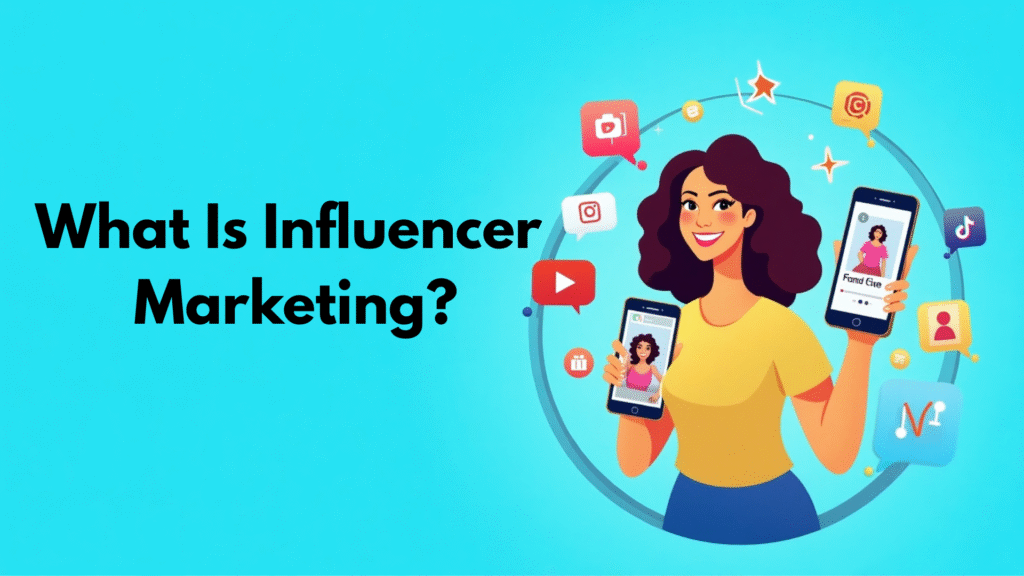
Influencer marketing pays creators based on follower reach and engagement rates rather than direct sales performance. Many marketers today successfully merge influencer marketing with affiliate marketing strategies to boost their financial performance.
Influencer Tiers:
- Nano (1K–10K followers)
- Micro (10K–100K)
- Macro (100K–1M)
- Mega (1M+)
The selection process for influencers by brands involves evaluating both their budget constraints and the specific niche and demographics they need to target. According to Influencer Marketing Hub, businesses receive $5.20 in revenue from each dollar they invest in influencer marketing strategies.
1.4 What Is MLM (Multi-Level Marketing)?
Through their direct sales and their recruited team members’ sales activities, individuals generate income in the MLM business model. Businesses frequently market consumable products like those for beauty care, health maintenance and home use.
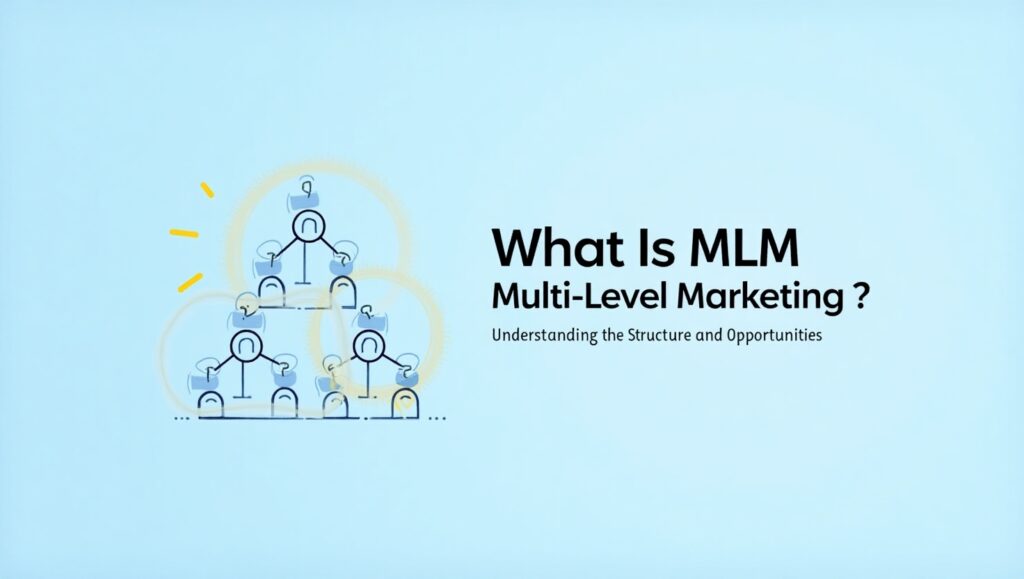
Participants typically:
- Purchase a starter kit
- Recruit others
- The business model enables participants to earn commissions from their sales and those made by their team members.
Table: Key Differences Between Affiliate Marketing and MLM
| Feature | Affiliate Marketing | MLM |
| Upfront Investment | None or low | Often required |
| Income Source | Personal marketing | Personal + team sales |
| Structure | Independent | Tiered/downline |
| Risk | Low | High |
MLM provides high returns to a select few while exposing participants to substantial risk and receiving criticism for its pyramid-like operational model. The majority of MLM participants fail to earn money, with studies showing that over 99% of them do not achieve profitability, which demonstrates that the MLM model is not sustainable for typical individuals.
2. Comparing Affiliate Marketing vs Digital Marketing
Affiliate marketing operates as a segment of digital marketing but maintains separate functions. Affiliate marketing represents a specific area within digital marketing that emphasizes performance outcomes.
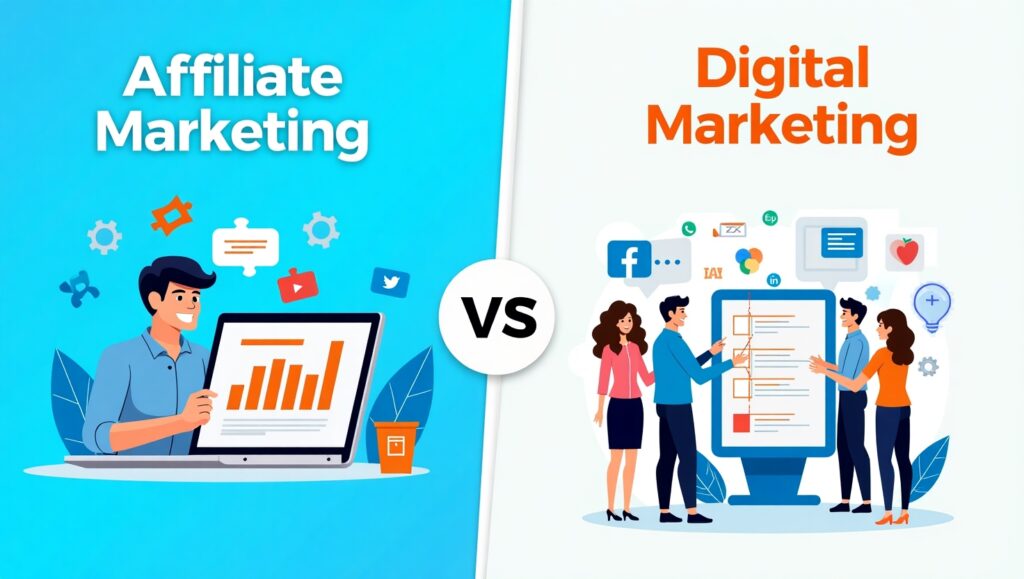
A digital marketing initiative could require the brand to spend thousands for brand awareness campaigns which may not generate an immediate return on investment. Affiliate marketing operates on a performance-based payment model where brands compensate only for tangible outcomes such as sales or leads. Budget-conscious advertisers find affiliate marketing appealing because it requires payment only for actual performance results.
Digital marketing campaigns build brand stories through retargeting ads and influencer partnerships, while affiliate campaigns prioritize conversion outcomes.
When to Use Which:
- Apply digital marketing strategies to oversee complete sales funnel management and expand brand presence.
- Use affiliate marketing for performance-driven, low-risk expansion
3. Affiliate Marketing vs Influencer Marketing
Affiliate marketing focuses on links and conversions. Influencer marketing aims to improve brand visibility through storytelling. Both methods boost sales, although they do so through distinct mechanisms.
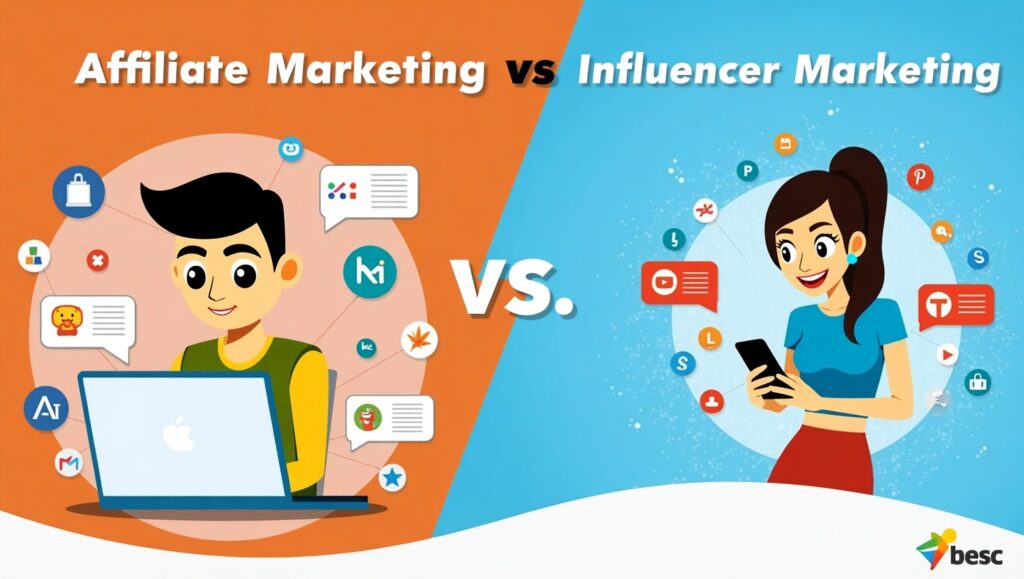
Example Scenario: A skincare brand launches a product. They:
- A skincare brand engages an influencer who shares a product introduction story on their social media platform.
- The influencer should add a purchase tracking discount link for affiliate marketing.
The hybrid approach of combining influencer marketing with affiliate marketing gains popularity because influencers receive flat fees and commissions while brands obtain marketing reach and measurable performance results. Marketers who participated in a 2024 survey indicated a preference for combining both strategies to achieve better ROI at a rate of 64%.
4. Affiliate Marketing vs MLM
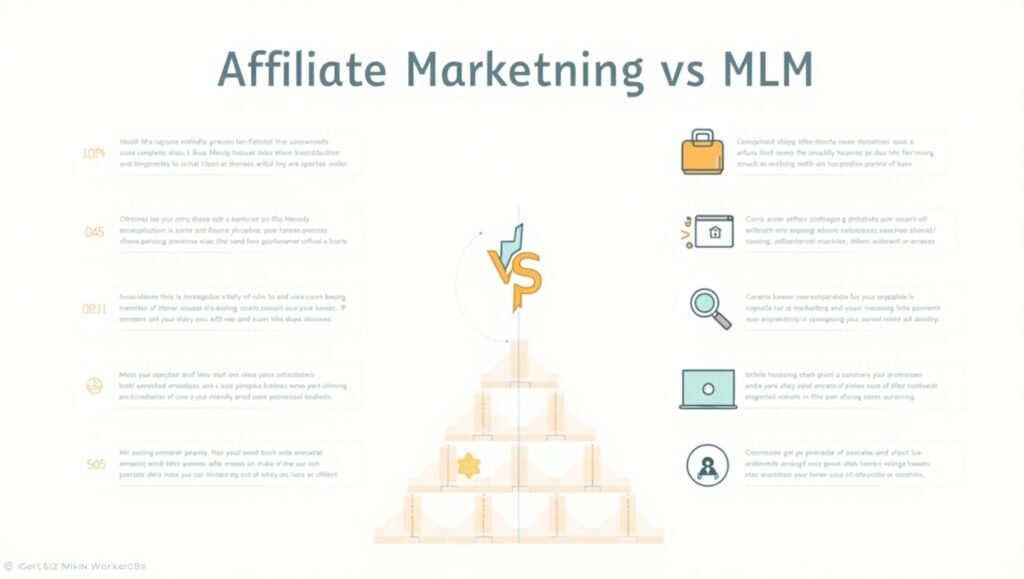
While both MLM and affiliate marketing provide commission-based income, affiliate marketing presents significantly lower risks and better scalability options.
MLM operations depend on ongoing recruitment and constant inventory investment. Many participants struggle to break even. To start affiliate marketing you only require a digital platform together with content and program access.
Statistical Insight: The FTC reports that more than 99% of people involved in MLM networks end up losing money. Affiliate marketers can initiate their earning process without financial risk through utilization of SEO tools along with email lists and social media platforms.
Case Example: The aspiring entrepreneur starts their business journey by purchasing a $500 starter kit from an MLM company. After six months, their expenditures reached $2,000 for products and events, yet they only earned $200. During this time,e a different entrepreneur establishes a YouTube channel where they market tech gadgets by using affiliate links to achieve $3,000 earnings without holding any physical inventory.
5. Affiliate Marketing in the Broader Digital Landscape
Affiliate marketing now functions as a core component of comprehensive digital strategies due to its seamless integration process. Affiliate marketing has become an essential component within broader digital ecosystems rather than existing as an independent strategy.
Many marketers now use:
- Email sequences to build trust
- Landing pages to optimize conversions
- Paid ads for traffic generation
- Automation tools for consistent income
Real-World Example: A tech YouTuber endorses software tool affiliate links during tutorial video broadcasts. Through the use of tracking tools and retargeting advertisements, marketers achieve $5,000 monthly from one campaign. Regular newsletter emails and a gated freebie helped support the campaign to expand their email list.
6. Frequently Asked Questions (FAQs)
Q1. Is affiliate marketing part of digital marketing?
Affiliate marketing is a specific branch dedicated to performance-based outcomes and operates within the larger framework of digital marketing strategies.
Q2. Influencer marketing targets brand recognition while affiliate marketing aims to drive measurable sales through specific performance outcomes.
Influencer marketing aims to increase brand visibility while affiliate marketing targets measurable sales results through performance-based commissions.
Q3. Can I mix affiliate and influencer marketing?
Yes. Numerous influencers use affiliate links in their media to generate additional revenue from their audience reach and interaction.
Q4. Is MLM the same as affiliate marketing?
No. MLM requires both team recruitment and team supervision. Affiliate marketing operates as a solo endeavor because it does not require a team structure.
Q5. What is digital and affiliate marketing combined?
Digital marketing strategies use technological platforms to distribute affiliate offers which helps in achieving wider reach and better targeting while increasing conversion rates.
Q6. Where can I locate affiliate programs designed for influencers?
Use affiliate platforms such as Impact, Rakuten and the Amazon Influencer Program for your search. These services provide analytics and creator tools for digital marketers.
Q7. Do I need to disclose affiliate links?
Yes. The FTC mandates that affiliates transparently inform their audience when they receive commission through a link.
Q8. Affiliate marketing has the potential to become a main source of income for successful marketers.
Absolutely. Many people achieve full-time income through affiliate marketing by maintaining consistency and utilizing effective strategies.
Q9. An affiliate influencer produces promotional content to drive sales, while a buyer purchases products via affiliate links.
An affiliate influencer promotes products using content. The buyer purchases products by using their affiliate link.
Q10. Between MLM and affiliate marketing, which option offers better long-term benefits?
Affiliate marketing proves to be more transparent and sustainable as a choice for those who build their presence online through brand development.
7. Conclusion: Which Model Wins in 2025?
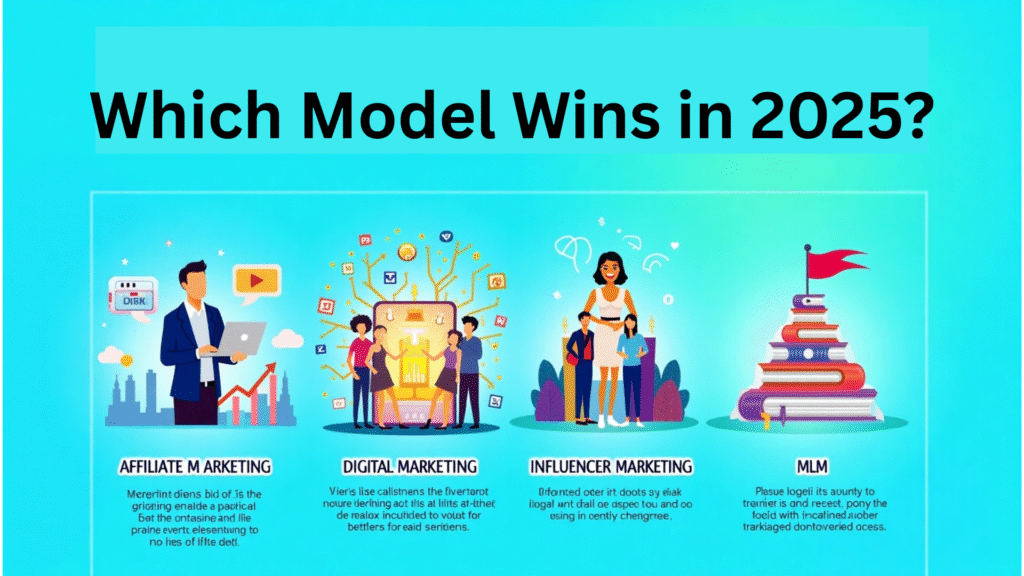
Affiliate marketing is remarkable in 2025 because businesses can enter the field with minimal barriers while earning through performance-based compensation and growing their operations easily. The digital-first economy perfectly supports this model which enables individuals to earn money through their content and website visits.
Businesses that want to achieve long-term brand equity and customer loyalty need to focus on digital marketing strategies. Influencer marketing maintains its success because it leverages personal connections and community influence. MLM attracts controversy because it provides substantial earning possibilities for a limited number of people while exposing the majority to various financial hazards.
Marketers who understand the differences between approaches and blend top-performing elements will succeed in the competitive online marketplace. Successful marketers combine diverse strategies to meet their audience’s needs and business goals while utilizing digital tools to build relationships that drive value growth.

